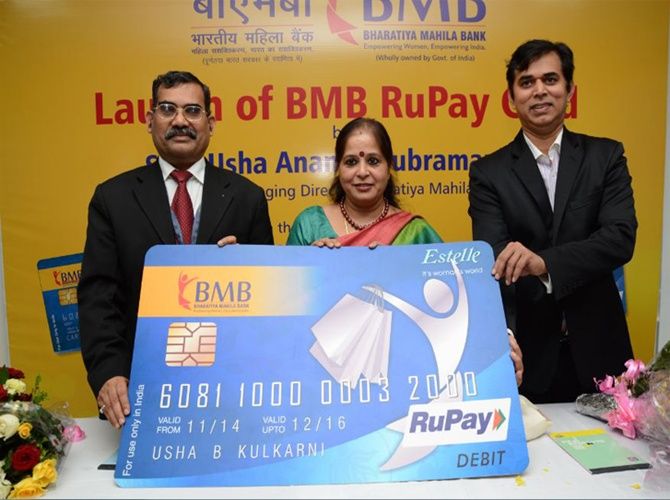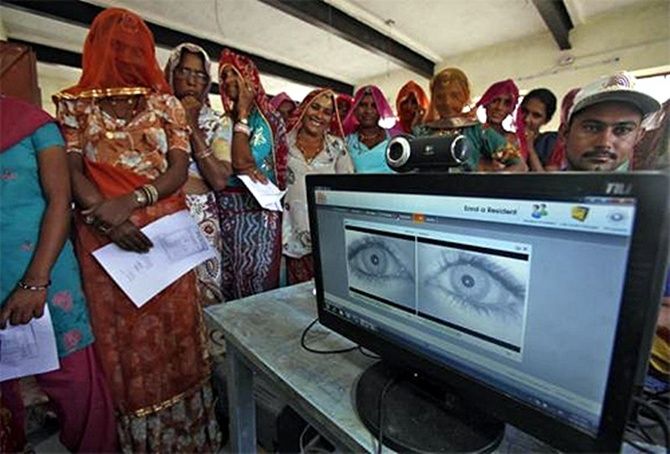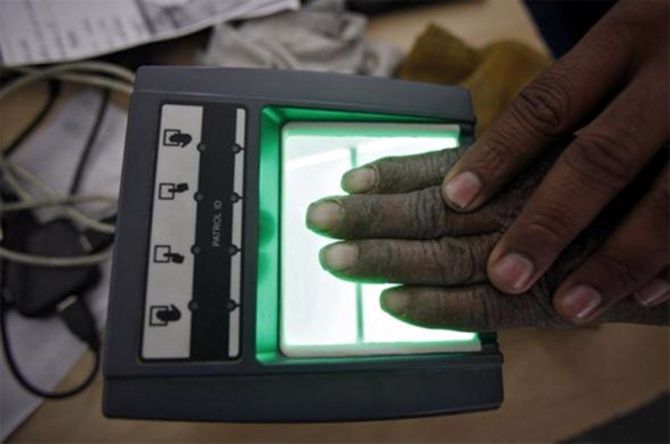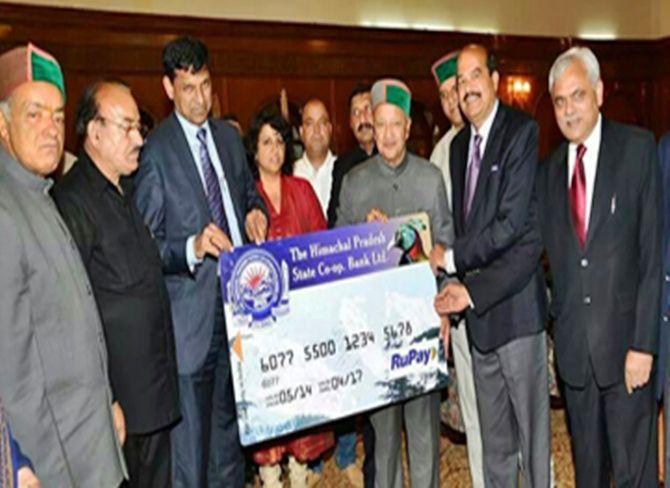 | « Back to article | Print this article |

Giving out another card, with a promise of insurance and a credit facility, also adds to the already large pool of existing smart cards by many state governments and central departments under their social welfare schemes.
The government has opted for the RuPay debit card over the Aadhaar-based platform for "last-mile" authentication in its Pradhan Mantri Jan Dhan Yojana.
The move, experts contend, could burden the scheme with a large additional cost and, arguably, a less effective financial inclusion model.
The beneficiary accounts will still be seeded with Aadhaar, both for Know Your Customer norms and identification for the overdraft facility. However, actual transactions of cash at the final leg would be done through RuPay debit cards. The card-based model has so far failed to work efficiently in including the poor in the formal banking sector.
By choosing a card over biometrics, the government seems to have opted for a "more traditional" route and might not have been "brave enough" to try the new one, said Praveen Chakravarty, founder trustee of IndiaSpend, and a former banker. The government contends, however, that using the card route will avoid the restrictions put by the Supreme Court on making Aadhaar mandatory for government schemes.
Issues

Giving out another card, with a promise of insurance and a credit facility, also adds to the already large pool of existing smart cards by many state governments and central departments under their social welfare schemes.
"The mode of payment of most of these schemes, be it biometrics or smart cards, are not synchronised. They mostly overlap each other and mean significant cost for the exchequer," said Chakravarty.
The most recent example of this is the Bhamashah Financial Empowerment Scheme of the Rajasthan government, under which each household will be given a card linked to a bank account.
Payments in all state welfare schemes of the government such as health insurance, pension or public distribution system will be sent to the biometric-enabled accounts. Several other states have embarked on similar projects.

The Unique Identification (UID) project went through a prolonged period of uncertainty. It was partly salvaged by Nandan Nilekani, the UID Authority of India's former chairman, during his meeting with the new Prime Minister.
But, in Narendra Modi's grand scheme, only parts of Nilekani's entire plan for financial inclusion have been brought on board. "The use of telephony and private banks would have created a more holistic financial inclusion ecosystem. The government has only taken bits of the model that was envisaged two years ago," said an expert associated with the Aadhaar programme.
According to a government official, under the financial inclusion plan of the Reserve Bank of India (RBI), around 180 million accounts have already been opened in the country but most are defunct.
"There are multiple problems with the chip and pin model of the card," the official said. There is a huge up-front cost of giving out cards (between Rs 50 and Rs 100 each), along with the recurring expenses to maintain it. The burden of card ownership, especially for the poor, can be onerous, with dangers of theft and, sometime, life threats."
Adding: "The target audience of this card (mostly rural, undereducated citizens) might also find it extremely difficult to operate them through PINs. A biometric-based model would have allowed them to just give their fingerprints and withdraw money."
Through the biometric-based transaction model, one can withdraw money using only the Aadhaar number and the fingerprint through micro-ATMs and also at retail outlets.
The official, who did not wish to be identified, added that as the Jan Dhan Yojana is planned to integrate with the Direct Benefits Transfer project, the biggest fear will be continued leakages in subsidies.
"You don't have to be physically present to withdraw money with a card, so a middleman can keep the cards and the PIN of villagers and not give them their full due." A mandatory biometric authentication would have significantly curtailed this issue, the official added.
 Why and next
Why and next
The government might have chosen to go without the mandatory Aadhaar authentication for transactions due to several overhangs at the project.
The biggest deterrent is the Supreme Court order which has directed the government to not make the UID number mandatory for availing welfare payments.
Also, though RBI had given a go-ahead to Aadhaar-based biometrics as an additional factor of authentication for card transactions, bankers had opposed the move. The matter is currently under review by a committee.
A little over half the country's population has been enrolled under UID; however, the other half might have lessened the reach. Also, proponents of the card-based model feel as biometric-based authentication always requires internet connectivity, the model might not work in far-flung regions.
"Card-based technology is tested and reliable. On biometrics, there is still a question mark, especially in India where so many people engage in manual labour and, therefore, could be susceptible to changing fingerprints. Biometric authentication might prove a challenge in such cases," said economist and social activist Reetika Khera.
Under the project, launched on Thursday, 21.4 million new accounts have already been opened so far, Finance Minister Arun Jaitley said on Saturday. The government's efforts to promote the 'swadeshi' RuPay debit card might have also gelled with Narendra Modi's 'Made in India' approach.
"If we use international cards, there is a currency outgo as the payment is settled aboard. RuPay will be the first domestic card. Everyone should use it. It can be an additional card," said a finance ministry official.
In the next stage, the government will try to make it an international payment gateway. Popularity of the Made-in-India RuPay card might be another reason to push this model. While there are 400 million existing debit cards, the RuPay ones have already crossed the 21.4-million mark in three days.